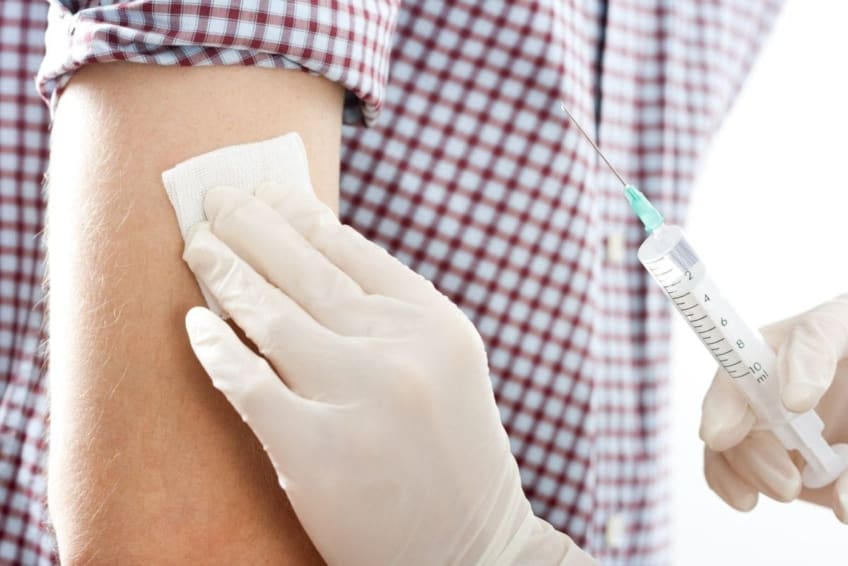
Girls are not the only ones who can benefit from the human papillomavirus (HPV) vaccine. Boys also can reduce their chances of developing some cancers if they get the vaccine.
The HPV vaccine was first developed to help prevent cervical cancer in women. Researchers now know the vaccine can help prevent HPV-related cancers in men, too.
Cancers of the mouth and throat are on the rise, according to the Centers for Disease Control and Prevention (CDC). So are cases of anal cancer. People typically aren’t screened for these cancers. This makes them harder to spot. Treating these cancers can be harder because they aren’t found early. But the HPV vaccine can help prevent them.
What is HPV?
Human papillomavirus is a common sexually transmitted virus. It’s the most common sexually transmitted infection (STI) in the United States. There are more than 100 types of HPV. HPV can cause genital warts and cancers of the cervix, vagina, vulva, anus, penis, and throat.
HPV is passed from one person to another through skin-to-skin contact. Some people never realize they have it because they have no symptoms. They can still spread the infection to others.
Path to improved health
Doctors recommend vaccinating boys and girls for HPV at ages 11-12. Preteens who are vaccinated at this age will need only two rounds of the vaccine. These rounds will be spaced 6-12 months apart. If your child is already 15 years old, he will need three rounds of the vaccine. The 3 rounds will take place within a 6-month period.
It’s never too late to get the vaccine. Setting the age for the vaccine at 11-12 is intended to protect boys and girls before they’re exposed to HPV. It’s possible to get the vaccine as early as 9 years of age.
Vaccines to prevent HPV
There are currently 3 vaccines used to prevent the spread of HPV, according to vaccines.gov. All 3 vaccines are approved by the FDA to prevent HPV infections:
- Gardasil is an HPV vaccine for males and females.
- Gardasil 9 is an HPV vaccine for males and females.
- Cervarix is an HPV vaccine for females only.
All 3 vaccines prevent infection from the most common types of HPV: types 16 and 18. Gardasil also protects against HPV types 6 and 11. Gardasil 9 guards you from infection against an additional 5 HPV types: 31, 33, 45, 52, and 58.
Know these vaccines don’t provide protection from other sexually transmitted infections. Also, they don’t protect you from all HPV types. They do protect you from those types most likely to cause cancer.
The American Academy of Family Physicians (AAFP) recommends that boys and girls ages 11-12 receive HPV vaccines as part of their vaccination schedule.
When should I not give my child this vaccination?
Your child shouldn’t be vaccinated for HPV if he or she is severely allergic to any of the components of the vaccine. Your child shouldn’t get the vaccine if he or she has a severe allergy to yeast. Tell your doctor about all your child’s allergies.
Women who are pregnant should wait to get the HPV vaccine. It’s safe for women who are breastfeeding.
If your child is sick, you should wait to vaccinate him or her. Ask your doctor if you aren’t sure.
Things to consider
Side effects from the HPV vaccine are usually mild. They will likely go away on their own. Examples of mild side effects include:
- A sore arm from the injection.
- Redness or swelling where the shot was given.
- A low-grade fever.
- Headache.
Also, sometimes people faint following an injection. Your doctor will have you stay seated or lying down for up to 15 minutes following the shot.
As with any medication, it’s possible to suffer more serious side effects with the HPV vaccine. There’s a very small chance that taking any vaccine can cause serious injury or death. Also, severe allergic reactions are rare but do sometimes occur.
According to the U.S. Department of Health and Human Services (HHS), the benefits of the vaccine far outweigh any risk. “Studies show that HPV vaccines are very safe and have been used in the United States and around the world for many years,” reports HHS.
Questions for your doctor
- Should my child get the HPV vaccine?
- Which HPV vaccine (Gardasil, Gardasil 9, or Cervarix) is best for my child?
- How many rounds of this vaccine will my child need?
- How long will the vaccine last before he or she needs a booster shot?
- What side effects should we expect?
- My child had the Gardasil vaccine. Should he or she now have the Gardasil 9?
- If my child is already sexually active, is it too late for the vaccine?
Resources
National Institutes of Health, MedlinePlus: Human Papillomavirus (HPV) Vaccine
U.S. Department of Health & Human Services, vaccines.gov: HPV (Human Papillomavirus)
![]()
Copyright © American Academy of Family Physicians
This information provides a general overview and may not apply to everyone. Talk to your family doctor to find out if this information applies to you and to get more information on this subject.







